Ethics and Aesthetics in Foucault and Levinas
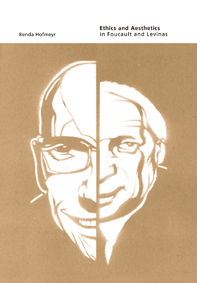 2005. Ethics and Aesthetics in Foucault and Levinas. PhD Thesis, Radboud University Nijmegen (Print Partners Ipskamp). PAGES: 278. ISBN: 90-9019341-3
2005. Ethics and Aesthetics in Foucault and Levinas. PhD Thesis, Radboud University Nijmegen (Print Partners Ipskamp). PAGES: 278. ISBN: 90-9019341-3
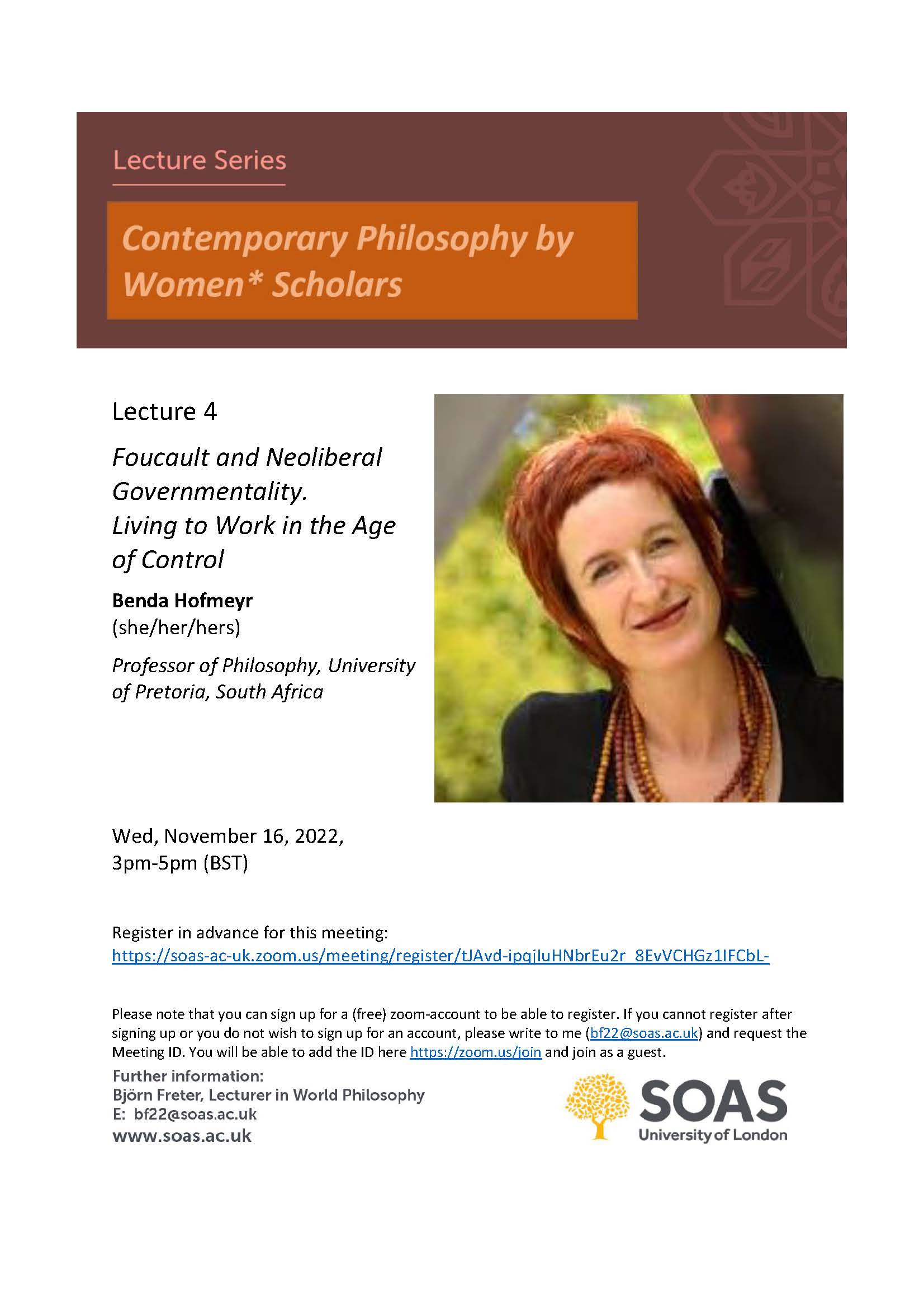
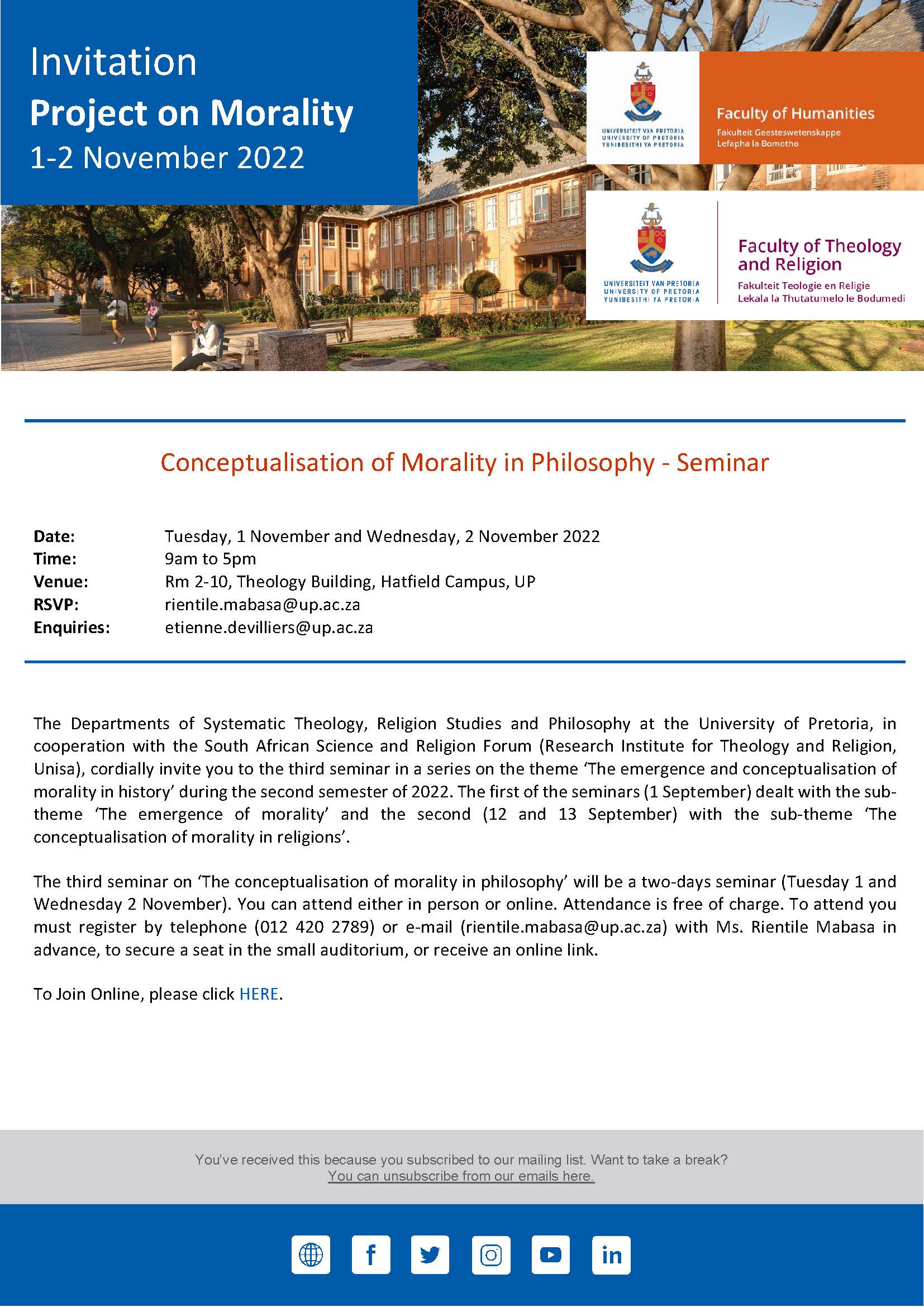
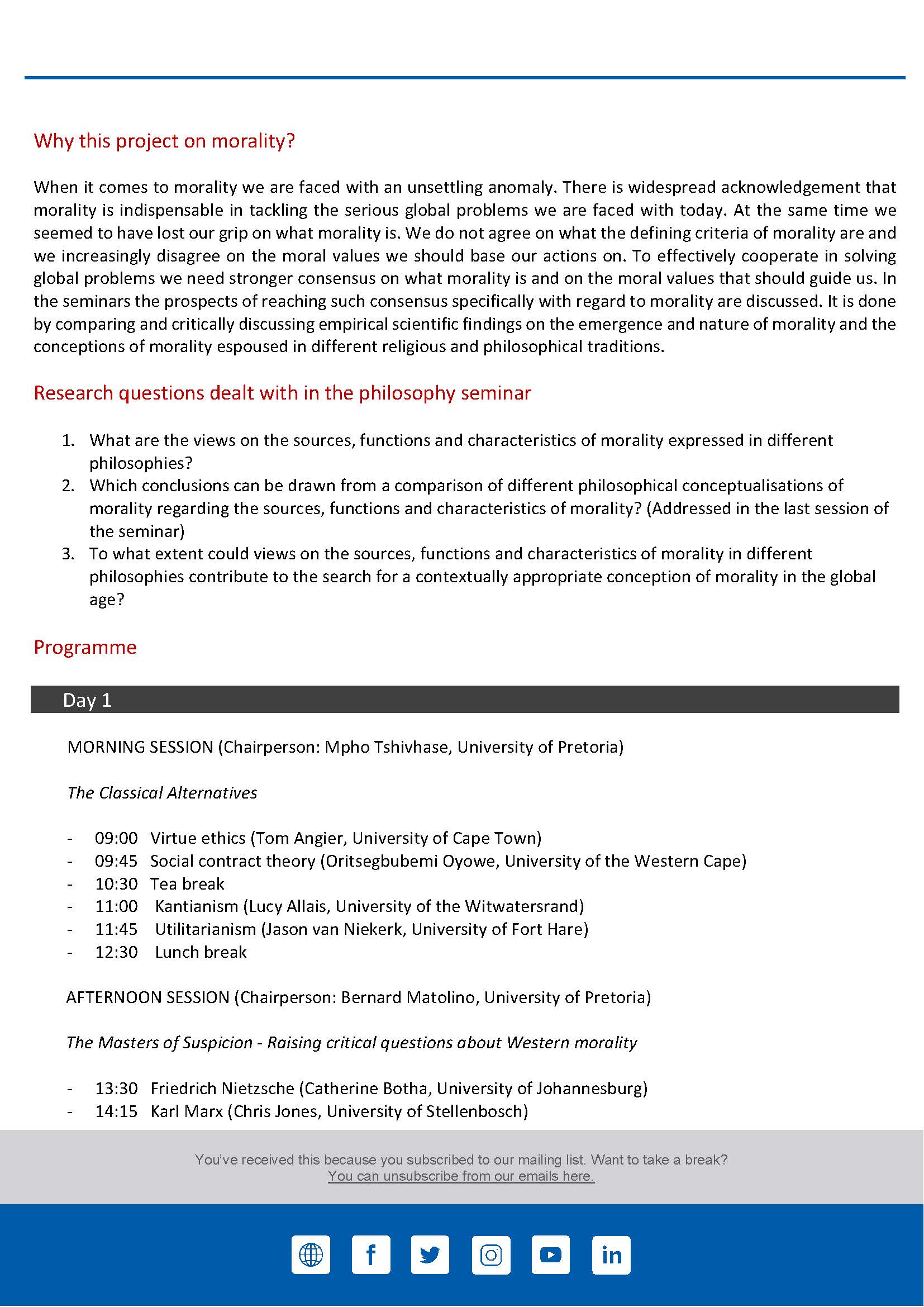
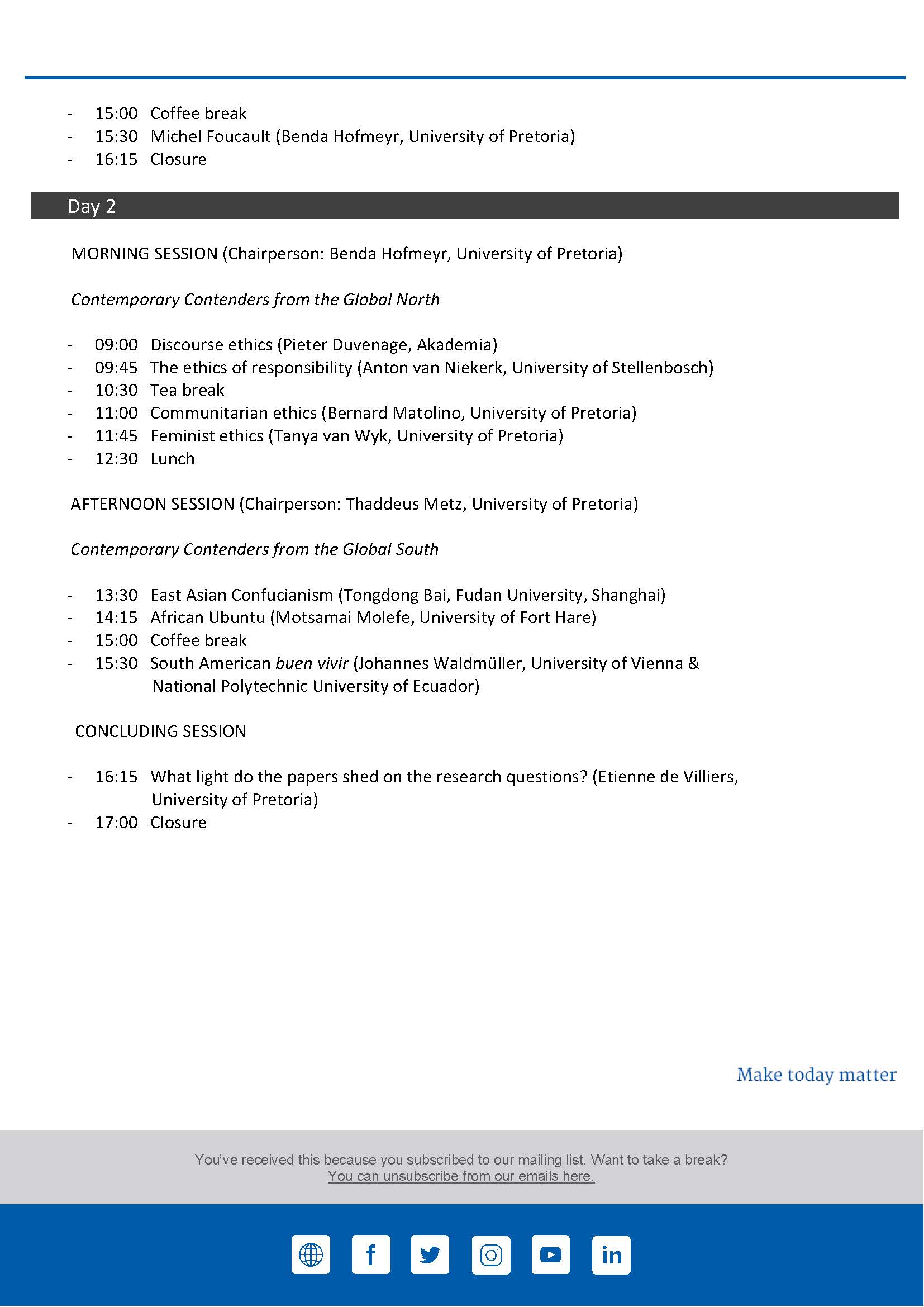
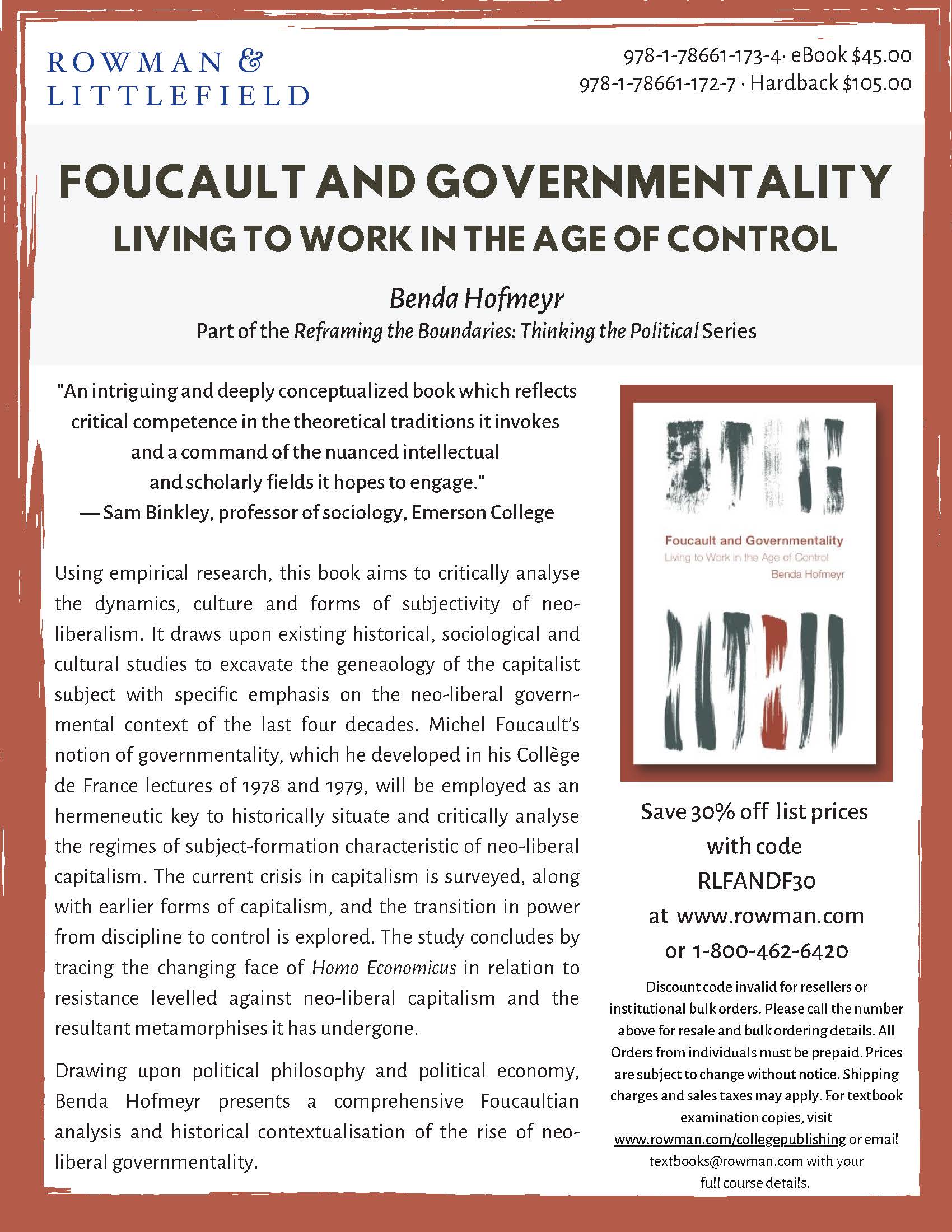
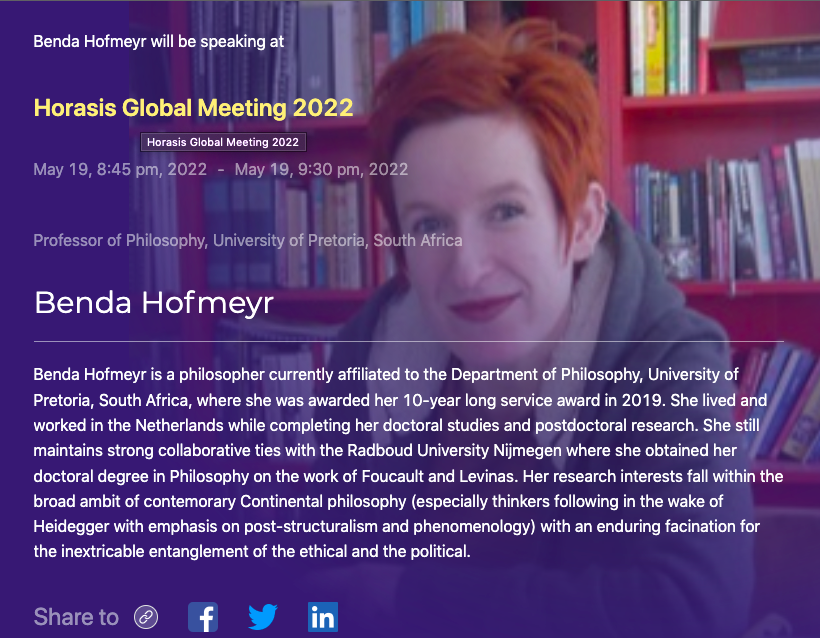
Philosophy Panel: Ethics in an Epoch of Catastrophes
Direct URL: https://www.runtheworld.today/app/speaker-promotion/659038-90738-41328
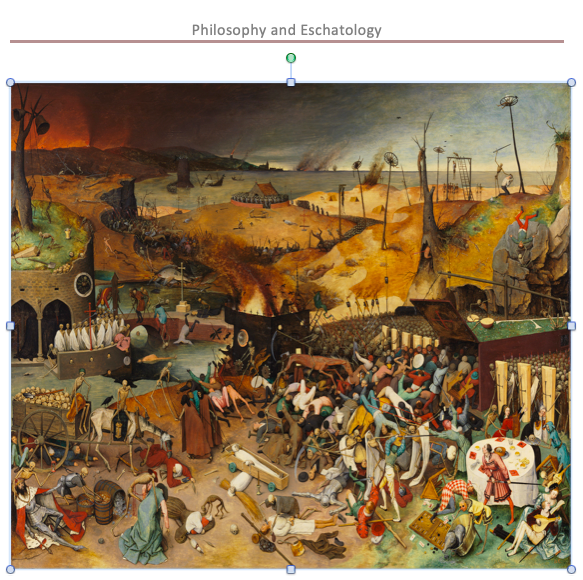
Paper presentation: The Place of Eschatology in Levinas's Conceptualization of Time
Conference: Annual conference of South African Society of Phenomenology
Conference theme: Philosophy & Eschatology
Dates: 19-20 November 2021
Abstract:
Reflection on eschatology – the last things for humankind, the end of the world, the final moment of history – at this particular historical juncture is undoubtedly apt, if unwittingly so. Oddly enough it is not the possibility of imminent nuclear armageddon, ecological collapse or five million children starving that brought humanity to a grinding halt, but a viral pandemic the likes of which we have not seen since the Spanish flu in 1918 that killed more than 50 million people around the world in just over a year. In fact, given the aforementioned pre-existing crises, we did not need a novel coronavirus to justify critical reflection on the eventual collapse of the world. The end has been imminent for quite some time. By its very definition eschatology is that paradoxical attempt to offer a way of thinking about that which is unthinkable. Hence, there are countless different styles of eschatologies. For Levinas in Totality and Infinity [TI], as the conference call points out, eschatology provides the subject with the standpoint of justice beyond history. How should this “beyond history” be understood? In the preface to TI Levinas explains this as follows:
This ‘beyond’ the totality and objective experience is, however, not to be described in a purely negative fashion. It is reflected within experience. The eschatological, as the ‘beyond’ of history, draws beings out of the jurisdication of history and the future; it arouses them in and calls them forth to their full responsibility (TeI, xi; TI, 23).
For Levinas, this “full” responsibility – a responsibility even for the Other’s responsibility – is sustained by eschatology. It can perform this role only insofar as the eschatological, which Levinas describes as beyond the totality or beyond history, does not remain only history. “Eschatology “is a relationship with a surplus exterior to the totality, as though the objective totality did not fill out the true measure of being” (TeI, xi; TI, 22). The “beyond history” refers not to a Hinterwelt, but to that which interrupts history. It is that which history cannot recoup. Eschatology in Levinas is not a question of the future, but a disturbance or interruption of the present. Hence, Levinas expressly distinguishes what he calls “the eschatology of messianic peace” from teleology (TeI, x; TI, 22).
To extend “a reality beyond the sentence pronounced by history” into infinite time, Levinas appeals to “the fecundity of subjectivity by which the I survives itself” (TeI, 225; TI, 247), which leads into the discussion of paternity in the fourth section of TI. Levinas formulates the point more neutrally in “The Trace of the Other” (1974) when he evokes an “eschatology without hope for the self or without liberation in my time”. In “Violence and Metaphysics” (1964), Derrida takes Levinas’s phrase to mean an “eschatology which awaits nothing” and as such is “infinitely hopeless”, as if lack of hope for the self can be equated with hopelessness (Ed, 141; WD, 95). This obscures Levinas’s point, however. Levinas is concerned with what he calls a “time without me”, a “time beyond the horizon of my time” (EDE, 192; TO, 349). In other words, Levinas challenges Heidegger’s being towards death with the possibility of a passage to the time of the Other. Levinas says that before the accomplishment of history, there is “still time”, specifying later that this is “to still have time, to be against death” and to have “time to be for the Other, and this time of recover meaning despite death” (TeI, 212-213; TI, 235-236).
In this contribution, I seek to critically interrogate the place of eschatology in Levinas’s conception of time . I contend that one cannot understand Levinas’s emphatic insistence in Totality and Infinity (1961), that eschatology sustains ethical responsibility independently from his conceptualization of time. What would be the take away of Levinas’s “eschatological vision” (TI, 23) for us today in the face of COVID-19?
ALBERT LITHULI CELEBRATION DAY 20 NOV 2021
Paper presentation: A Philosophical Reflection on the Legacy of Albert Lithuli with specific reference to his charismatic leadership style as theorized by Max Weber.
Abstract:
In this contribution on this occasion in which we paid homage to Albert Lithuli, I offered some philosophical reflections on leadership inspired by Max Weber’s notion of charisma. I propose that this notion offers a heuristic lens through which we might gain some insight into Lithuli’s charismatic and bold traditional leadership style that captured the imagination of the disenfranchised African people of South Africa during the 1930s through to the 1960s. This was a period in South African history during which the African people were radically disempowered and they were led by a man – indeed in the thrall of a leader - to which they largely had no access. They had no access to their leader on account of successive bans imposed over many years on Lithuli by the then government designed to keep him away from larger South African centres and from all public meetings aimed at minimizing his influence and effectiveness as a leader. What then accounts for the enigmatic influence of the leader, Chief Albert Lithuli?
>>> Click on the images above for more details and the full programme <<<
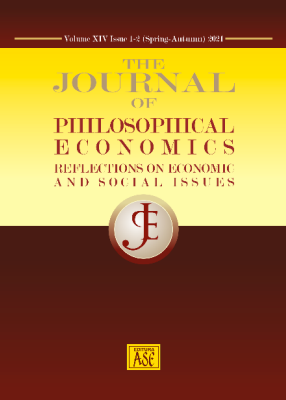
I published 'Neoliberal Governmentality, Knowledge Work and Thumos' in the Journal of Philosophical Economics. Download it here.
Research has shown that the knowledge worker, the decisive driver of the knowledge economy, works increasingly longer hours. In fact, it would appear that instead of working to live, they live to work. There appears to be three reasons for this living-to-work development. First, the knowledge worker ‘has to’ on account of the pressure to become ever more efficient. Such pressure translates into internalized coercion in the case of the self-responsible knowledge worker. Secondly, working is constant, because the Internet and smart technologies and mobile devices have made it ‘possible’. It gives the worker the capacity and management omnipotent control. In the final instance, the neoliberal knowledge worker works all the time because s/he paradoxically ‘wants to’. It is a curious phenomenon, because this compulsive working is concomitant with a rise of a host of physical, emotional, and psychological disorders as well as the erosion of social bonds. The paradox is exacerbated by the fact that the knowledge worker does not derive any of the usual utilities or satisfactions associated with hard work. Elsewhere I have ascribed this apparent contradiction at the heart of the living-to-work phenomenon to the invisible thumotic satisfaction generated by knowledge work. In the present article, I argue that neoliberal governmentality has found a way to tether thumos directly to the profit incentive. I draw on Foucault’s 1978-1979 Collége de France lecture course in which he analysed neoliberal governmentality with specific emphasis on the work of the neoliberal theorist of human capital, Gary Becker.
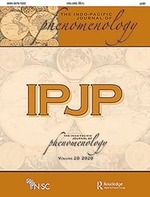 I published 'The Feasibility of Resistance in the Workplace. A Critical Investigation' in The Indo-Pacific Journal of Phenomenology. Download it here.
I published 'The Feasibility of Resistance in the Workplace. A Critical Investigation' in The Indo-Pacific Journal of Phenomenology. Download it here.
In this article, I undertake a critical interrogation of the complex relations of control operating in the contemporary workplace of the knowledge worker by drawing on Foucault’s theorisation of power and resistance. I plot the risks to which the knowledge worker are exposed, the conditions of possibility as well as the challenges that complicate productive resistance in the workplace. In the process, I make use of an array of existing scholarly research that utilises the Foucauldian framework of the relationality of power and develops some Foucauldian concepts further and applies them to our present context.
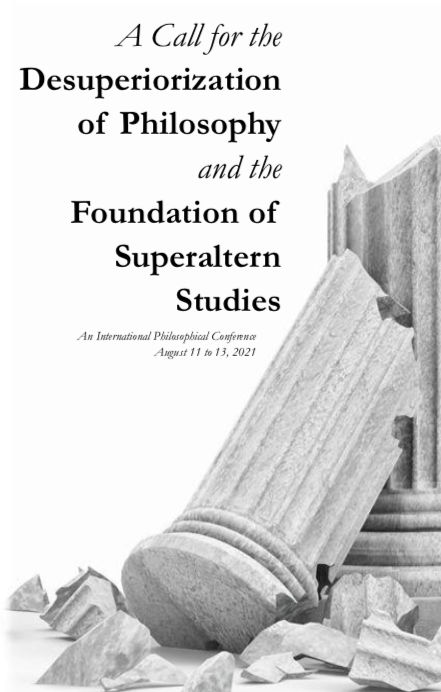 I presented a paper at the International Conference, A Call for the Desuperiorization of Philosophy and the Foundation of Superaltern Studies.
I presented a paper at the International Conference, A Call for the Desuperiorization of Philosophy and the Foundation of Superaltern Studies.
11-13 August
Title of paper: "Whence the Western Superiority Complex?"
Download the programme here.
Click on the image below to read my abstract.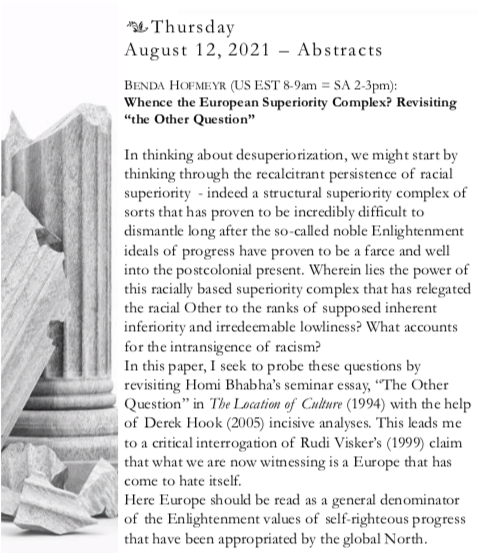
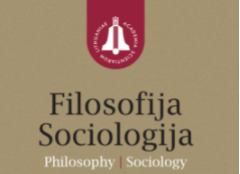 I published "The Relation Between Work and Thumos. A Critical Interrogation of the Motivation Behind Knowledge Work Compulsion" in Filosofija. Sociologija 32(3): 250-258. Download it here.
I published "The Relation Between Work and Thumos. A Critical Interrogation of the Motivation Behind Knowledge Work Compulsion" in Filosofija. Sociologija 32(3): 250-258. Download it here.
In this brief paper, I attempt to come to a critical understanding of an intriguing phenomenon at the heart of a broader question, i.e. what are we today – as knowledge workers – in relation to our present understood as the globalizing neoliberal governmentality in which life is reduced to constant work under conditions of comprehensive control? Previous attempts to interrogate the nature of knowledge work and the knowledge worker have led me to conclude that these workers do not work to live, but live to work. An important reason seems to be that the neoliberal knowledge worker works all the times because s/he paradoxically wants to. This presents a paradox since the overinvestment in knowledge work does not appear to generate proportionate gains for the working subject. In my attempt to arrive at some kind of provisional explication for this phenomenon of compulsive work, I critically interrogate Fukuyama’s contention that work has a thumotic origin. To this end, I briefly discuss Plato’s conceptualization of thumos and Hegel’s understanding of the significance of labour.
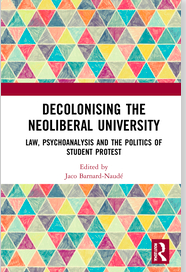 I published "An Untimely Meditation on a Time 'Out of Sync'" in an edited volume (ed. Jaco Bernard-Naudé) titled, Decolonising the Neoliberal University. Law, Psychoanalysis and the Politics of Student Protest (2021) (Routledge), pp. 111-121. Download it here.
I published "An Untimely Meditation on a Time 'Out of Sync'" in an edited volume (ed. Jaco Bernard-Naudé) titled, Decolonising the Neoliberal University. Law, Psychoanalysis and the Politics of Student Protest (2021) (Routledge), pp. 111-121. Download it here.
EXTRACT: Almost all of South Africa’s peoples came from elsewhere; almost none are left that can rightfully claim to be autochthonous. All of its peoples descended from the north either by land or by sea – all of them have blood on their hands, the colonialists’ hands undoubtedly the bloodiest. The first white settlers found the native hunter-gatherers and tribespeople under threat from the southwardly migrating Bantu peoples. In the subsequent colonial and apartheid pasts the hands of lighter hues were far bloodier than others, whereas in the more recent and immediate pasts, hands of all complexions have become indistinguishable in the dirt and disgrace that stain them. Mzansi[i] is not Graceland,[ii] to be sure; Mzansi is the place of incessant disgrace whose perpetrators belong to all races, all colours, all socio-economic positionalities.[iii] It is a place and time of pervasive civil disgruntlement with persistent inequality and injustice, a time of direct and structural violence, of stagnating social, political and economic developments, of irrational politics and the fragmentation of society.
[i] isiXhosa for the country of South Africa (literally meaning ‘south’). The isiZulu variation is Mzansti.
[ii] Paul Simon’s 1986 LP, Graceland was recorded in Johannesburg with local musicians during the time of the international anti-apartheid boycott. His hope was that art could transcend politics at the risk of undermining the anti-apartheid cause. The lyrics portray Graceland as a place of hospitality and of good will.
[iii] As poignantly depicted by J. M. Coetzee in his 1999 novel, Disgrace, which won the Booker Prize. The author was also awarded the Nobel Prize in Literature four years later.
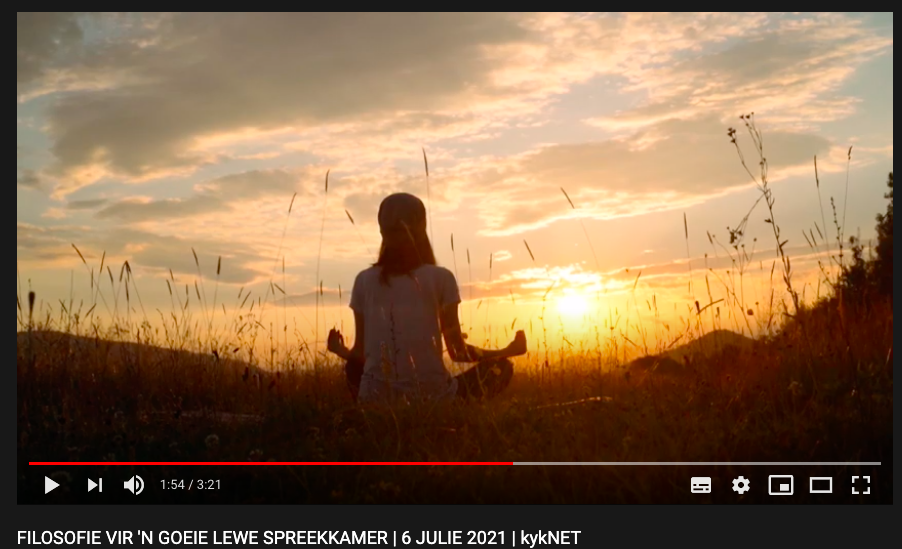 On Friday 6 July 2021 I appeared on DSTV's programme on KYKNET titled, SPREEKKAMER upon invitation to speak about the role and place of Philosophy in the life of the individual today.
On Friday 6 July 2021 I appeared on DSTV's programme on KYKNET titled, SPREEKKAMER upon invitation to speak about the role and place of Philosophy in the life of the individual today.
EXTRACT: Ons lewe in vreemde tye. In die tyd voor die pandemie was daar al ‘n grootskaalse fragmentering van betekenisgewende verwysingsraamwerke en waardestelsels wat as kompas in die lewens van individue gedien het. Dit gepaardgaande met die sekularisasie van groot dele van die bevolking veral jonger generasies asook die verwarring en die trauma wat die pandemie meegebring het, beteken dat meeste mense sonder soek na BETEKENIS of SIN. Godsdiens is nie meer die bron van rigting en betekenis waartoe meeste hulle wend nie. En daar buite vind ‘n mens ‘n proliferasie van autoriteite – waarseêrs, samesweringstoerieë, die teenstrydige insigte van sogenaamde kenners, om net ‘n paar voorbeelde te noem – wat net verwarring saai en meer vrae as antwoorde ontlok. Hoe maak ʼn mens nou eintlik sin van die sinnelose geweld, die irrasionele politiek, en die verbrokkeling van ons samelewing wat so kenmerkend is van ons tyd? Ek sou sê dit verklaar die vergrype van die fundamentalisme en populisme in groot dele van die wêreld vandag.
To view the contribution click here.
 On Friday 5 June 2021 I spoke to clinical psychologist, Dr Eugene Viljoen about "What happened to us since the start of the pandemic?" (in Afrikaans). It was hosted by the Suid-Afrikaanse Akademie vir Wetenskap en Kuns. The talk and the question and answer session is available on the SAAW&K's Facebook page (Videos).
On Friday 5 June 2021 I spoke to clinical psychologist, Dr Eugene Viljoen about "What happened to us since the start of the pandemic?" (in Afrikaans). It was hosted by the Suid-Afrikaanse Akademie vir Wetenskap en Kuns. The talk and the question and answer session is available on the SAAW&K's Facebook page (Videos). Dr Viljoen is ‘n praktiserende kliniese sielkundige met 30 jaar ervaring. Sy spreekkamer ervaringe het ‘n rykdom van insige opgelewer ten opsige van hoe die pandemie een en almal affekteer. L uister saam na sy ondervindings in Hoë Sorg in hospitale waar hy berading voorsien het aan die personeel asook sy ervarings met mense soos ons – werkende mense wat die onsekerheid wat met die pandemie gepaard gaan die hoof moet bied.
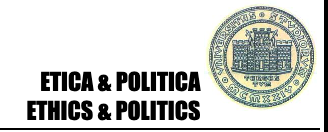
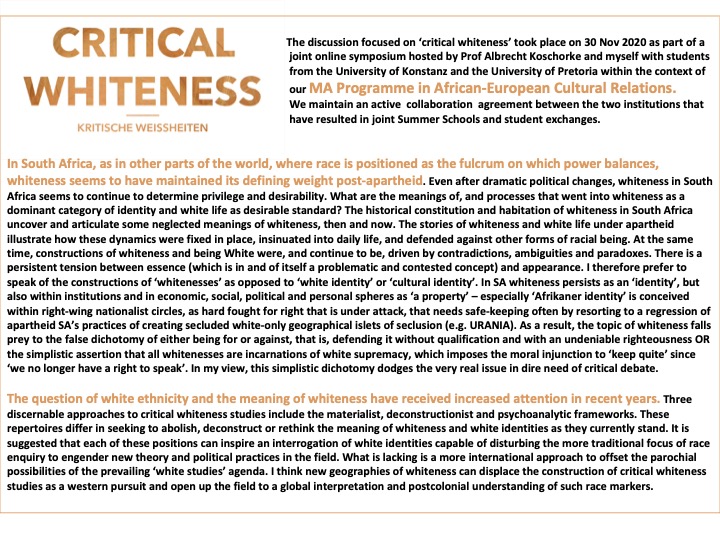
 On 7 October 2020 I presented “Lojale verset: Gedateerd of aktueel? NP van Wyk Louw in gesprek met Foucault” in an online symposium on NP van Wyk Louw 50 jaar na sy dood* which was organised by Suid-Afrikaanse Akademie vir Wetenskap en Kuns
On 7 October 2020 I presented “Lojale verset: Gedateerd of aktueel? NP van Wyk Louw in gesprek met Foucault” in an online symposium on NP van Wyk Louw 50 jaar na sy dood* which was organised by Suid-Afrikaanse Akademie vir Wetenskap en Kuns
*LINK takes you to the recording of the symposium.
See https://www.facebook.com/saakademie/
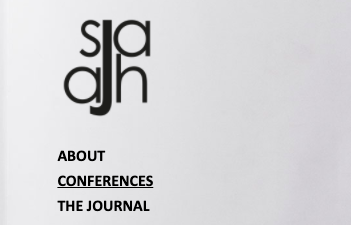 Together with Anusharani Sewchurran (DUT) I presented “Archive Alive: The impact of Digitization” at the 14thNational Conference of the South African Journal of Art History [DIGITAL CONFERENCE: 25-27 September 2020]
Together with Anusharani Sewchurran (DUT) I presented “Archive Alive: The impact of Digitization” at the 14thNational Conference of the South African Journal of Art History [DIGITAL CONFERENCE: 25-27 September 2020]
“…if all records told the same tale – then the lie passed into history and became truth. ‘Who controls the past,’ ran the Party slogan, ‘controls the future: who controls the present controls the past’” (Orwell, 1984). Archiving is an age-old practice. Current possibilities afforded by digital humanities have been generative, as digitization is easier given user-friendly software and enhanced digital storage capacities. In the main, South African digital archivists focus on addressing historical invisibilities (Fourie and Green 2013; Du Plessis 2012-2014; Stellenbosch hidden year’s music project and UWC Mayibuye archives). Developing contextual archives is extremely important in South Africa, as it allows some measure of offsetting local epistemicide-type (Grosfoguel 2013) erasure that occurred during the colonial and apartheid eras. Our paper theorizes the node where Bakhtin’s heteroglossia (1981) meets Afrofuturism (Dery 1994), because we argue that memory (history/archiving) needs disruption, a war of counter-memory that can simultaneously leap forward and backward in time. Although heteroglossia was originally used to explore literature, it has become very useful as a means of creating multivocality. We look at how contextual archives may be created, using practices from museum theatre within a digital space
r
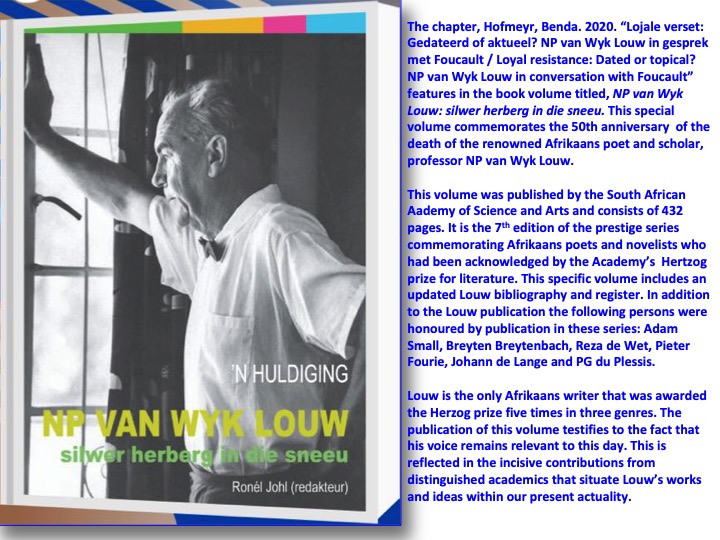 r
r
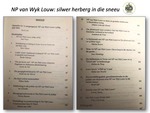
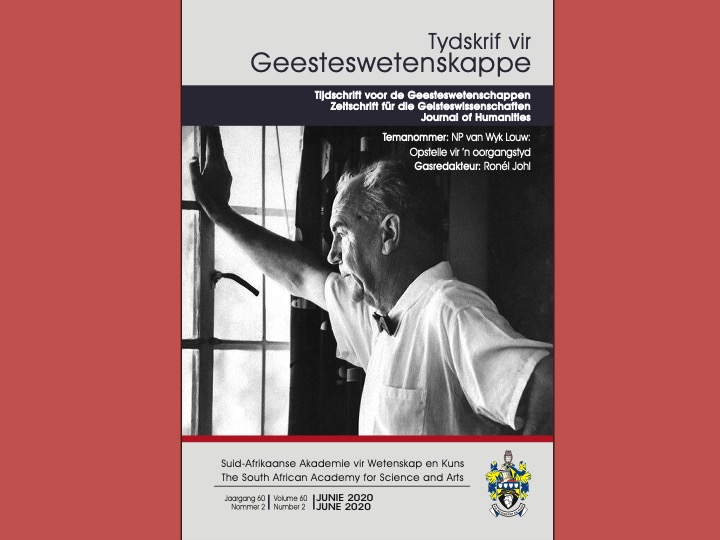 Hofmeyr, A. B. 2020. “Faithful Defiance: Dated or Pertinent? N. P. van Wyk Louw in conversation with Foucault” (in Afrikaans). In Tydskrif vir Geesteswetenskappe. 60(2): 322-336.*
Hofmeyr, A. B. 2020. “Faithful Defiance: Dated or Pertinent? N. P. van Wyk Louw in conversation with Foucault” (in Afrikaans). In Tydskrif vir Geesteswetenskappe. 60(2): 322-336.*
In this essay, I argue that NP van Wyk Louw’s 1939 concept of “loyal resistance”, although a construct mobilised in the name of Afrikaner nationalism, retains critical significance for our time if read through the lens of Michel Foucault’s notion of “transgression”. Both “loyal resistance” and “transgression” announce a field of fruitful tension which promises the possibility of empowered action even in a time of utter impotence. Now is a time of power movements that engulf the globe and of corrupt local machinations of power. I contend that even at this historical juncture and in this “strange place”, it is possible to live “highly” if one lives in the spirit of continuous resistance.
Louw’s own time was a time of conflicting tensions. In the 1920s and 1930s he fought for the consolidation and ennoblement of Afrikaans (during this time his volume of essays, Lojale verset, [“loyal resistance”] was written); the 1950s were a period of political self-complacency, and the 1960s a seemingly unassailable hegemony. Lojale verset, like Liberale nasionalisme (“liberal nationalism”), is an expression of Louw’s central concern with the question of the continued existence of the Afrikaner people and is therefore inherently Afrikaner-centric. He was unequivocally an apartheid intellectual. In his time, Afrikaner identity was still in the making and Afrikaner nationalism not yet fully established. The 1930s were a time of unrest, white poverty and painful memories of defeat in the Anglo-Boer War. His thought is coloured by a political vacillation between, on the one hand, an unambivalent loyalty to his people and the unwavering belief in the separation of the races and, on the other hand, his resolve to tell the truth to the powers-that-be, his standing up for those wronged by the state and, on occasion, his defending segments of the broader black population. He was constantly caught in the double bind of “loyal” and “resistance”.
Against this backdrop, I attempt to place his notion of “loyal resistance” in critical dialogue with Foucault’s understanding of the Bataillian concept of “transgression” – a concept that likewise derives its critical force from the field of tension between limit and vio lation or taboo and transgression.
Both thinkers’ primary and undisputed source of inspiration was Nietzsche. Despite their divergent historical situatedness, both were critical of critique, and both embraced the promise of the Aufklärung, as conceived by Kant, as a “critical ontology of ourselves”. Both rejected self-complacency in favour of self-overcoming. I therefore contend that the two thinkers can justifiably be brought into dialogue without resorting to selective and misleading reading strategies.
For Foucault, transgression is inherently about resistance to stifling limits imposed by power structures without exceeding those limits. To exceed limits would be to end existence, existence that is in itself finite. Transgression is therefore an admission that defiance would be impossible without a measure of loyalty to that which one resists. His entire intellectual, political and ethical project is devoted to finding ways in which the limits to which individuals are subjected can be resisted; to transform critique levelled in the form of an inevitable limitation into a practical critique that takes the form of a possible transgression.
Louw and Foucault find common ground in the undeniably Nietzschean belief in the empowering force of dangerous, destructive thought or critique; “thought of the limit” that saves humanity from perhaps the greatest danger to spiritual life – the snare of self-complacency and self-assured intolerance. According to Louw, “great critique” of this kind is a condemnation of one’s own complicity in the sins of one’s people, it is an atonement and a cleansing. Both Louw and Foucault held the conviction that although the individual is an intrinsic part of his or her own community and history, he or she has the ability to change his or her mode of belonging to that community and history.
A critical ontology is therefore an analysis of the limits of one’s being, not in the sense of an essential, unchanging being, but contingent, multiple and fluid ways of being human subjects. It entails a limit attitude or a historicocritical attitude that is experimental, local and specific.
If we therefore reconsider “loyal resistance” from the perspective of “transgression”, it appears that resistance is indubitably connected to loyalty, perhaps even impossible without it.
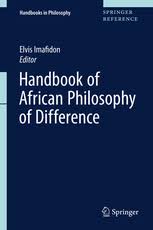 Hofmeyr, A. B. 2020. “The Meaning of Trauma for the Future. Reflections from a (Post-)Colonial Present”. In Imafidon, E. (Ed.) Handbook of African Philosophy of Difference. Cham: Springer, pp. 1-14.
Hofmeyr, A. B. 2020. “The Meaning of Trauma for the Future. Reflections from a (Post-)Colonial Present”. In Imafidon, E. (Ed.) Handbook of African Philosophy of Difference. Cham: Springer, pp. 1-14.
https://doi.org/10.1007/978-3-030-04941-6_21-1
A critical interrogation of who we are in this particular present has always been a crucial and inherent part of philosophical discourse. This contribution reflects upon the (post-)colonial South African present from a genealogical and psychoanalytic point of view. It sets out from the Nietzschean assertion that historical memory should first and foremost serve life. Hence the importance of a certain measure of forgetfulness in relation to the past, especially the traumatic past. Apart from conscious forgetfulness, Freud comprehensively theorized the impact of unconsciously repressed trauma on the present. It was also Freud who made dreams into the mirror and meaning of the unconscious. For him, dreams were specifically the fulfilment of desire. For Foucault and Lacan, it is much more complex than that for, as the former argues, the presence of meaning in the dream is not meaning making itself fully evident – it offers meaning while ephemeralizing it (Foucault 1954). Drawing on genealogy and psychoanalysis as diagnostic toolkits, I will attempt to understand what trauma is to the future as a means to theorize subject-formation in this strange place that is the (post-)colonial, post-apartheid South African present.
Visit the Springer website here to order a copy.
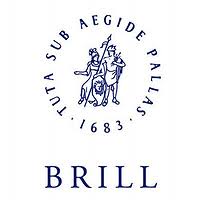
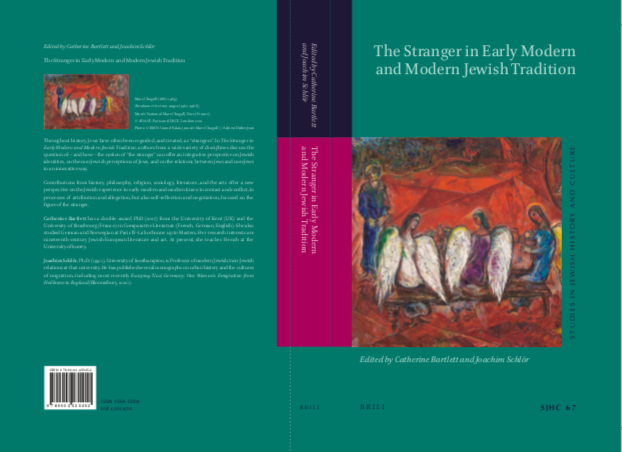 Hofmeyr, A. B. 2021. “The Strange Face & Form of the Stranger in Levinas”. In Bartlett, C. (Ed.) Rethinking the Notion of the Stranger. Boston, MA: Brill, pp. 309-333. Download it here.
Hofmeyr, A. B. 2021. “The Strange Face & Form of the Stranger in Levinas”. In Bartlett, C. (Ed.) Rethinking the Notion of the Stranger. Boston, MA: Brill, pp. 309-333. Download it here.
What does the notion of the ‘stranger’ signify in Emmanuel Levinas’s thought? Elsewhere I have argued that one finds an opposition between the alterity of transcendence and the alterity of strangers in his thought. The alterity of ‘strangers’ referred to in that context denotes the concrete worldly stranger that the self does not identify with – be it on account of race, gender, sexual orientation, religious or political conviction, and the like. However, in Levinas’s work one also finds that the ‘stranger’ signifies a conceptually complex and multi-dimensional construct that exceeds and supplements its signfication as ‘not one of us’.
The opposition between the alterity of transcendence and the alterity of horizontality may be unpacked by recasting it in the mould of the antithetical couplet of the ‘face’ and the ‘form’ of the stranger in Levinas. In other words, the notion of the stranger appears in different guises in Levinas’s work, different guises that imply divergent obligations as well as rights. Paradoxically, as is well-known, for Levinas, the ‘face’ of the stranger is faceless, without features, not flesh, but the absolute alterity of transcendence, that is, the Other. The form of the stranger, on the other hand, is precisely endowed with an incarnated recognizable face that belongs to the mundane historical world, revealed in being horizontally. This apparent opposition is further complicated by the fact that the face cannot be separated from its form. The Stranger as Other is the Stranger as another person that is ‘not one of us’. The absolute Other addresses us through the incarnated other person. As we shall see, on occasion Levinas himself gets caught in this double-bind, a snare that raises questions about the status of his ethical metaphysics. In the following contribution, I endeavour to excavate what exactly the notion of the stranger signifies in Levinas’s thought, first as face and then as form. In the fourth conclusive part of the essay, I critically reflect on the implications of the fact that the face and the form of the stranger are in fact inseparable. First, however, I want to take a step back from Levinas’s own analyses of the complex relationship between the stranger and the O/other and consider several models of this relationship that will enable us to situate Levinas’s own analyses more precisely.
 Hofmeyr, A. B. & Sewchurran, A. 2020. “A Critical Reflection in Digital Disruption in Journalism and Journalism Education”, In Acta Academica: Critical Views on Society, Culture and Politics 52(2): 181-203.
Hofmeyr, A. B. & Sewchurran, A. 2020. “A Critical Reflection in Digital Disruption in Journalism and Journalism Education”, In Acta Academica: Critical Views on Society, Culture and Politics 52(2): 181-203.
In this essay, we critically reflect on digital disruption in journalism and journalism education with specific focus on the South African context. After contextualising the problematics in terms of what Castells terms the “information technology revolution”, we define data visualisation and survey the existing literature on the subject. The history of journalism education in South Africa is briefly revisited before assessing the current state of the profession in the country. The dangers posed by digital visualisation to the core ethos and function of journalism as a vehicle in the service of contributing to a resilient democracy is thrown into relief by utilising critical concepts from the work of Foucault, Habermas and Fuchs. We subsequently cite a few examples of the undisclosed bias inherent in data visualisation. In conclusion, we consider the feasibility and potential effects of the necessity to adopt data visualisation techniques on journalism in South Africa.
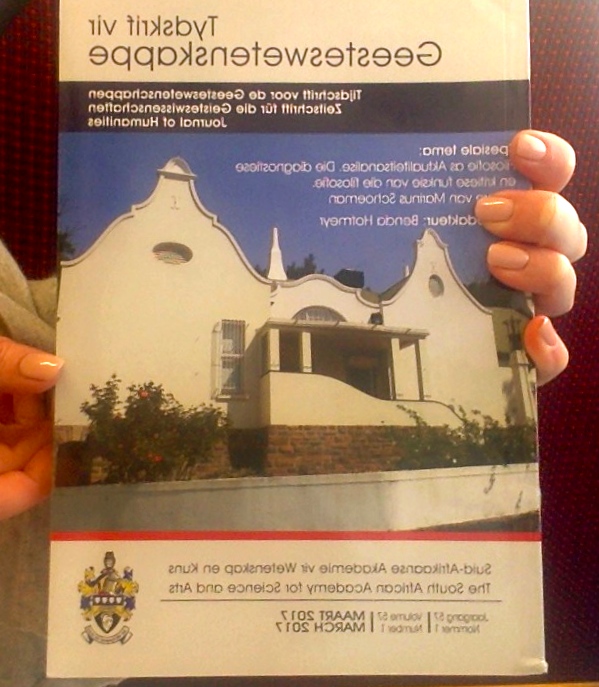 Publication of special theme issue of the Journal of Humanities (Volume 57, No. 1), celebrating the career of retired colleague, Marinus Schoeman.
Publication of special theme issue of the Journal of Humanities (Volume 57, No. 1), celebrating the career of retired colleague, Marinus Schoeman.Theme: Philosophy as Analysis of the Present. The Diagnostic and Critical Function of Philosophy
Guest Editor: Benda Hofmeyr
Contributors: Philippe van Haute, Paul van Tongeren, Marieke Borren, Matthias Pauwels, Catherine Botha, Marinus Schoeman, et al.
Theme: Justice and the Other
The Summer School took place 5-12 June 2017 and seven students from the University of Pretoria participated. Their countries of origin are diverse including Zimbabwe, Malawi, Zambia, Nigeria, and of course South Africa. For many it was their very first visit to Europe. The theme of the Summer School was 'Myths of Origin'. The Summer School was organized under the auspices of the collaboration between the MA African European Cultural Relations Programme (UP) and the Masterstudiengang Kulturelle Grundlagen Europas.
A Second bi-lateral Summer School (9-14 April 2018) on “Narratives of Origin and Founding Myths” were hosted at the University of Pretoria as part of the ongoing cooperation between the MA programme “Cultural Foundations of Europe” at the University of Konstanz and the MA programme “African-European Cultural Relations” at the University of Pretoria.
Both schools were organised and led by Prof. Albrecht Koschorke (University of Konstanz), Prof. Stephan Mühr (UP) and Prof Benda Hofmeyr (UP). The participants included 10 students (which included doctoral students) from the University of Konstanz and 11 students and doctoral candidates from the University of Pretoria. Travel expenses were borne by the International Office of the University of Konstanz and the Erasmus+ programme, and the costs of room and board and a field trip for the students from the University of Konstanz were covered by the University of Pretoria.
- Paper presentation at the Humanities for the Environment Conference, an international conference hosted by the University of Pretoria from 4-8 August 2017
- Paper presented: The Tragedy of the Commons Revisited
Find the Call and the Programme here
 - In 2018, Benda was elected to serve as member of the Expert Panel Pool of the Fonds Wetenschappelijk Onderzoek Vlaanderen (VWO), which is the Belgian equivalent of the National Research Foundation.
- In 2018, Benda was elected to serve as member of the Expert Panel Pool of the Fonds Wetenschappelijk Onderzoek Vlaanderen (VWO), which is the Belgian equivalent of the National Research Foundation.
 - Benda received her second consequtive NRF rating (2018-2023).
- Benda received her second consequtive NRF rating (2018-2023).
 - In 2018, Benda secured a contract for a monograph from Rowman & Littlefield International academic publishers. The scheduled date for publication is end of 2021. The title of the book is Foucault & Governmentality. Living to Work in the Age of Control.
- In 2018, Benda secured a contract for a monograph from Rowman & Littlefield International academic publishers. The scheduled date for publication is end of 2021. The title of the book is Foucault & Governmentality. Living to Work in the Age of Control.
Benda has had a number of opportunities to present some of her ideas on this topic both at UP and at UJ as an invited speaker at the latter's Philosophy colloquium series. Watch this space for updates...
- Paper presentation at the 6th Annual International Conference of the Centre for Phenomenology in South Africa, Cintsa, South Africa held on 13-14 June 2019, titled “Understanding Laughter in Ernest from a Philosophical Perspective”.
 - Theme: Philosophy of Laughter
- Theme: Philosophy of Laughter
- Call
-About the Centre for Phenomenology in South Africa
- Title of presentation:
Understanding Laughter in Earnest with the Help of Few Philosophers
What makes something as serious as Earnest so hilariously funny? Oscar Wilde’s ‘Trivial Comedy for Serious People’, titled, The Importance of Being Earnest continues to surprise the present-day reader with its rib-tickling buffoonery. Even the contemporary reader – hardened by slapstick of the most atrociously canned variety and the side-splitting stand-up tricks of the Trevor Noahs – cannot help but burst into involuntary laughter in response to this superbly executed little play.
At around the same date of its original publication, at the end of the 19th C, Henri Bergson tackled the serious task of a philosophical analysis of laughter, in particular the laughter caused by the comic. Put differently, he wanted to study what makes something so funny that one cannot help but burst out laughing.
In this paper, I put Bergson’s theory, which he considered to be quite a novel approach to the study of laughter in the history of Western philosophy since the Ancients, to the test by using it as a heuristic tool to understand how Wilde’s characters manage so effortlessly to be so delightfully funny. Pitting Bergson’s analytical prowess against Wilde’s comic genius yields, as it turns out, surprising insights into the paradoxical machinations of the comic. Bataille argues that when we laugh, we laugh at being. This is precisely what Wilde’s play illustrates performatively and Bergson’s analyses attempts to unravel theoretically. Although Bataille was not very amused by Bergson’s theorization of the comic, both share the conviction that laughter cannot be understood reductively as it is inherently a thing of human life (Bergson) and death (Bataille). ‘When you laugh’, writes Bataille, ‘you perceive yourself to be the accomplice of a destruction of what you are‘ (Inner Experience, 192). Similarly, the play’s punning title neatly captures ‘life’ and ‘destroys’ it by exploding the dominant Victorian moral principle that sincerity is its own reward, for in the end, it becomes clear that all of the protagonists maintain fictitious personae to escape the burdensome social obligations that accompany upper-class life in London.
Books
2013 (Ed. with Paul Hendrikse). Inventory of Possible Narrations. Amsterdam, NL: Onomatopee. PAGES: 180. ISBN: 978-90-78454-48-9
More information about this volume can be found on my News page
2009 (Ed.) Radical Passivity. Rethinking Ethical Agency in Levinas. Dordrecht, NL: Springer. Book Series: Library of Ethics and Applied Philosophy. PAGES: 166. ISBN: 978-1-4020-9346-3
Download Introduction • Download Chapter 1
2008 (Ed.) The Wal-Mart Phenomenon. Resisting Neo-Liberal Power through Art, Design & Theory. Maastricht: Jan van Eyck Academie Press. PAGES: 160. ISBN: 978-907207629-8. Download
2005 Ethics and Aesthetics in Foucault and Levinas. PhD Thesis, Radboud University Nijmegen (Print Partners Ipskamp). PAGES: 278. ISBN: 90-9019341-3
Chapters in books
2021. “Subjectivity in Need of Reconceptualization? The Neoliberal Mediation of Working Existence in the Network Society”. In Olivier, G. (Ed.) Online Civilization. Leiden: Brill, page numbers not yet available. Download.
2021. “An Untimely Meditation on a Time ‘Out of Sync’”. In Naude, J. & Rose, J. (Eds.) The South African Legacy. London: Polity Press, page numbers not yet available. Download.
2020 “The Strange Face & Form of the Stranger in Levinas”. In Bartlett, C. (Ed.) Rethinking the Notion of the Stranger. Boston MA: Brill, page numbers not yet available. Download
2020 (contribution to book). "The Meaning of Trauma for the Future. Reflections from a (Post-)Colonial Present". In Imafidon, E. (Ed.) Handbook of African Philosophy of Difference: The Othering of the Other. Springer (forthcoming) Download
2018 (contribution to book) “Levinas and the Possibility of Dialogue with Strangers'". In Winkler, R. (Ed.) Identity & Difference. London: Routledge, pp.85-101. Download
2015 (contribution to book) “Levinas and the (Post-)Colonial”. In Imafidon, E. (Ed.) The Ethics of Subjectivity. Perspectives Since the Dawn of Modernity USA: Palgrave Macmillan, pp. 280-295.
2015 (contribution to book) “The Ethics and Politics of Self-Formation in Foucault”. In Imafidon, E. (Ed.) The Ethics of Subjectivity. Perspectives Since the Dawn of Modernity. USA: Palgrave Macmillan, pp. 126-143 (reprinted upon request and with permission from the journal).
2009 (contribution to book) “Introduction: ‘Passivity as Necessary Condition for Ethical Agency?’”. In Hofmeyr, A. B. (Ed.) Radical Passivity. Rethinking Ethical Agency in Levinas. Dordrecht, NL: Springer. Book Series: Library of Ethics and Applied Philosophy, pp. 1-11.
2009 (contribution to book) “Chapter I: ‘Radical Passivity: Ethical Problem or Solution?’”. In Hofmeyr, A. B. (Ed.) Radical Passivity. Rethinking Ethical Agency in Levinas. Dordrecht, NL: Springer. Book Series: Library of Ethics and Applied, pp. 15-30.
2009 (contribution to book) “The Future that Death/Other gives: The Functioning of the Veil in Levinas”. In What does the Veil Know? Eds. Eva Meyer & Vivian Liska. Zürich: Edition Voldemeer. Vienna: Springer (pp. 71-82). Download
2008 (contribution to book) “Introduction: ‘Save Money. Live Better?’”. In Hofmeyr, A. B. (Ed.) The Wal-Mart Phenomenon. Resisting Neo-Liberal Power through Art, Design & Theory. Maastricht: Jan van Eyck Academie Press, pp. 11-30.
2008 (contribution to book) “Chapter III: ‘The Wal-mart Phenomenon: Power /Knowledge/ Resistance’”. In Hofmeyr, A. B. (Ed.) The Wal-Mart Phenomenon. Resisting Neo-Liberal Power through Art, Design & Theory. Maastricht: Jan van Eyck Academie Press, pp. 65-106.
2008 (contribution to book) “The Dystopian Reality of the Neo-Liberal Utopia” (Dutch translation). In Liberticide, eds. Robin Brouwer. Amsterdam: Ijzer, pp. 138-159. Download
2007 (contribution to book) “Artistic Over-Identification: Overrated or Underestimated. A Philosophical Revaluation”. In Cultural Activism Today: Strategies of Over-Identification. (Eds.). Gideon Boie & Matthias Pauwels. Rotterdam: Episode.
2007 (contribution to book) “The Art of Revolution”. In Revolution is Not a Garden Party. (Eds.) Maya and Reuben Fowkes. Manchester: Manchester Institute for Research and Innovation in Art and Design (MIRIAD), Manchester Metropolitan University, pp. 66-71. Download
 2005. Ethics and Aesthetics in Foucault and Levinas. PhD Thesis, Radboud University Nijmegen (Print Partners Ipskamp). PAGES: 278. ISBN: 90-9019341-3
2005. Ethics and Aesthetics in Foucault and Levinas. PhD Thesis, Radboud University Nijmegen (Print Partners Ipskamp). PAGES: 278. ISBN: 90-9019341-3
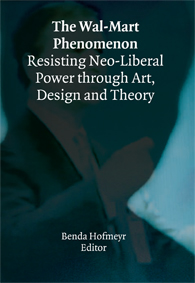 2008. (Ed.) The Wal-Mart Phenomenon. Resisting Neo-Liberal Power through Art, Design & Theory. Maastricht: Jan van Eyck Academie Press. PAGES: 160. ISBN: 978-907207629-8
2008. (Ed.) The Wal-Mart Phenomenon. Resisting Neo-Liberal Power through Art, Design & Theory. Maastricht: Jan van Eyck Academie Press. PAGES: 160. ISBN: 978-907207629-8
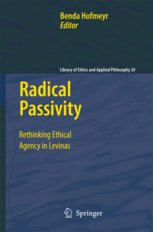 2009. (Ed.) Radical Passivity. Rethinking Ethical Agency in Levinas. Dordrecht, NL: Springer. Book Series: Library of Ethics and Applied Philosophy. PAGES: 166. ISBN: 978-1-4020-9346-3
2009. (Ed.) Radical Passivity. Rethinking Ethical Agency in Levinas. Dordrecht, NL: Springer. Book Series: Library of Ethics and Applied Philosophy. PAGES: 166. ISBN: 978-1-4020-9346-3
2013. (Ed.) Inventory of Possible Narrations. Amsterdam: Onomatopee. PAGES: 180 ISBN 978-90-78454-48-9
Editors: Paul Hendrikse (visual artist) & Benda Hofmeyr
Contributors: Ingrid Winterback, Michiel Heyns, Mark Behr, Ilse Carla Groenewald & Basha Faber
Inventory of Possible Narrations revolves around the life of South African writer and poet Ingrid Jonker, who committed suicide in 1965 at age 32 and who has grown to become an icon in her native country after the fall of the Apartheid regime. Jonker became a public figure of mythical proportions, a symbol in the identity defining process of South Africa.

Ulrike Kistner, Leonhard Praeg & Benda Hofmeyr
The only useful thing about university rankings is that they illuminate something essential about the contradictions that accompany the process of globalising neoliberal governance.
Universities have been enmeshed in this process ever since they started thinking of themselves as institutions struggling to retain fidelity to time and place. Read more...